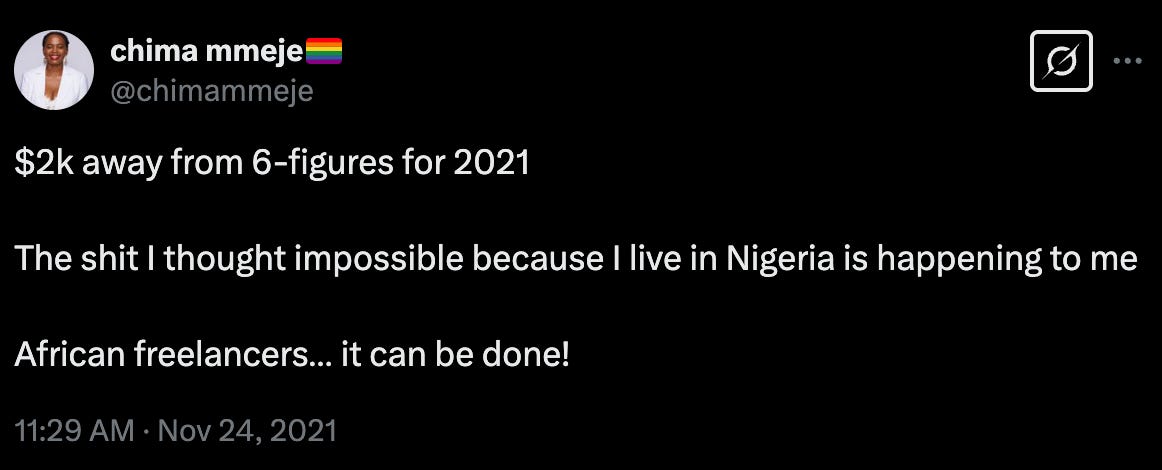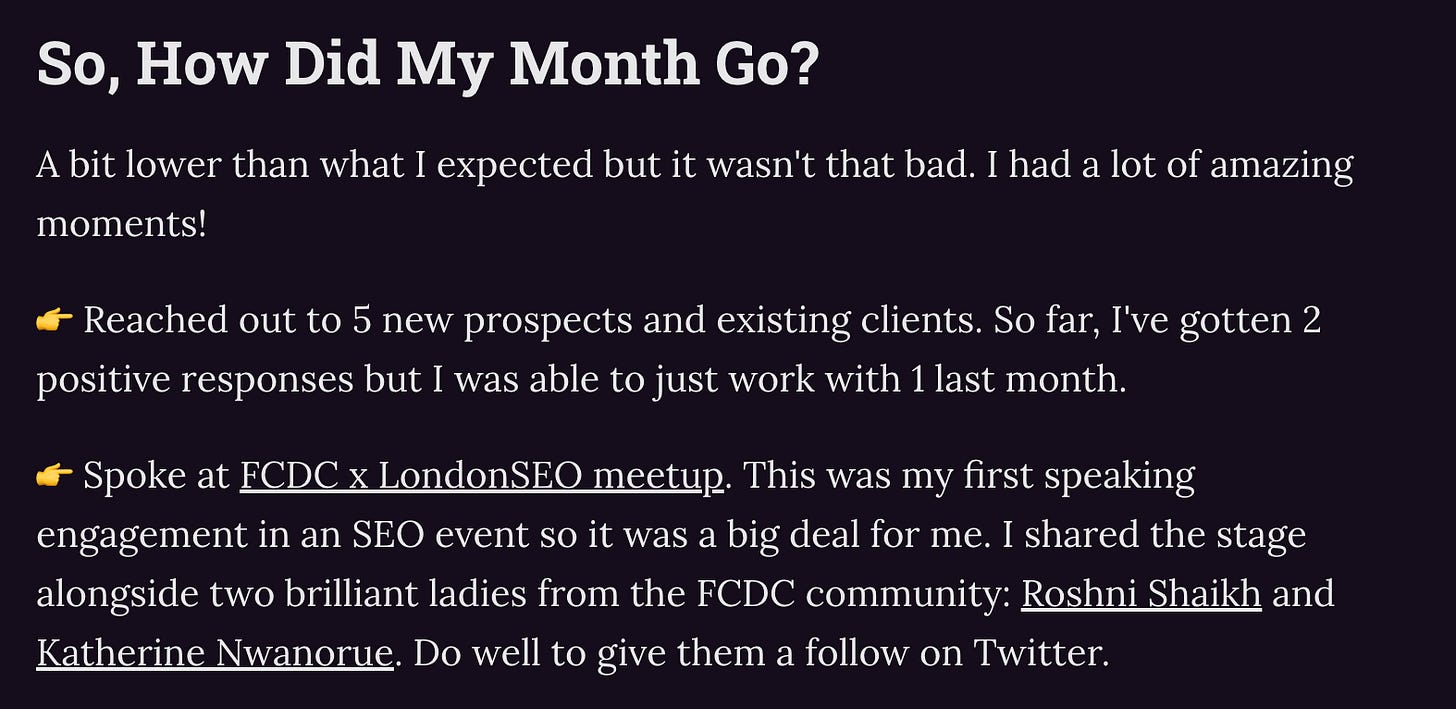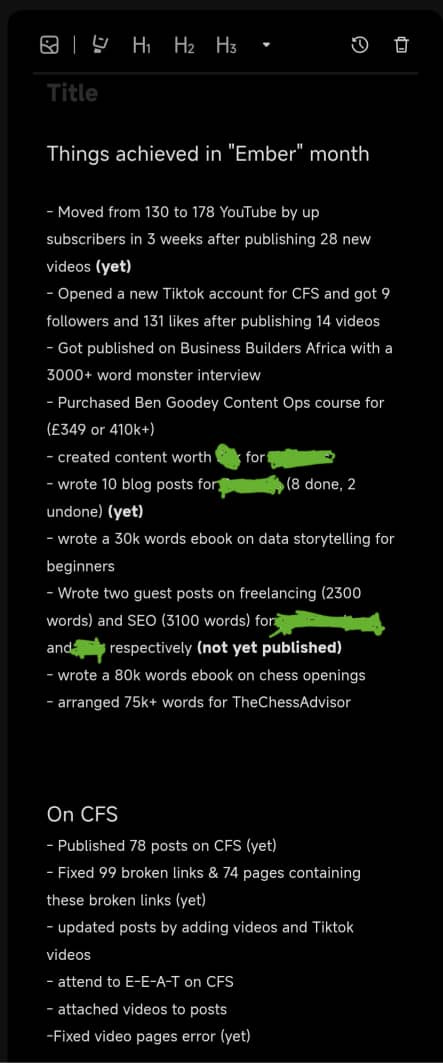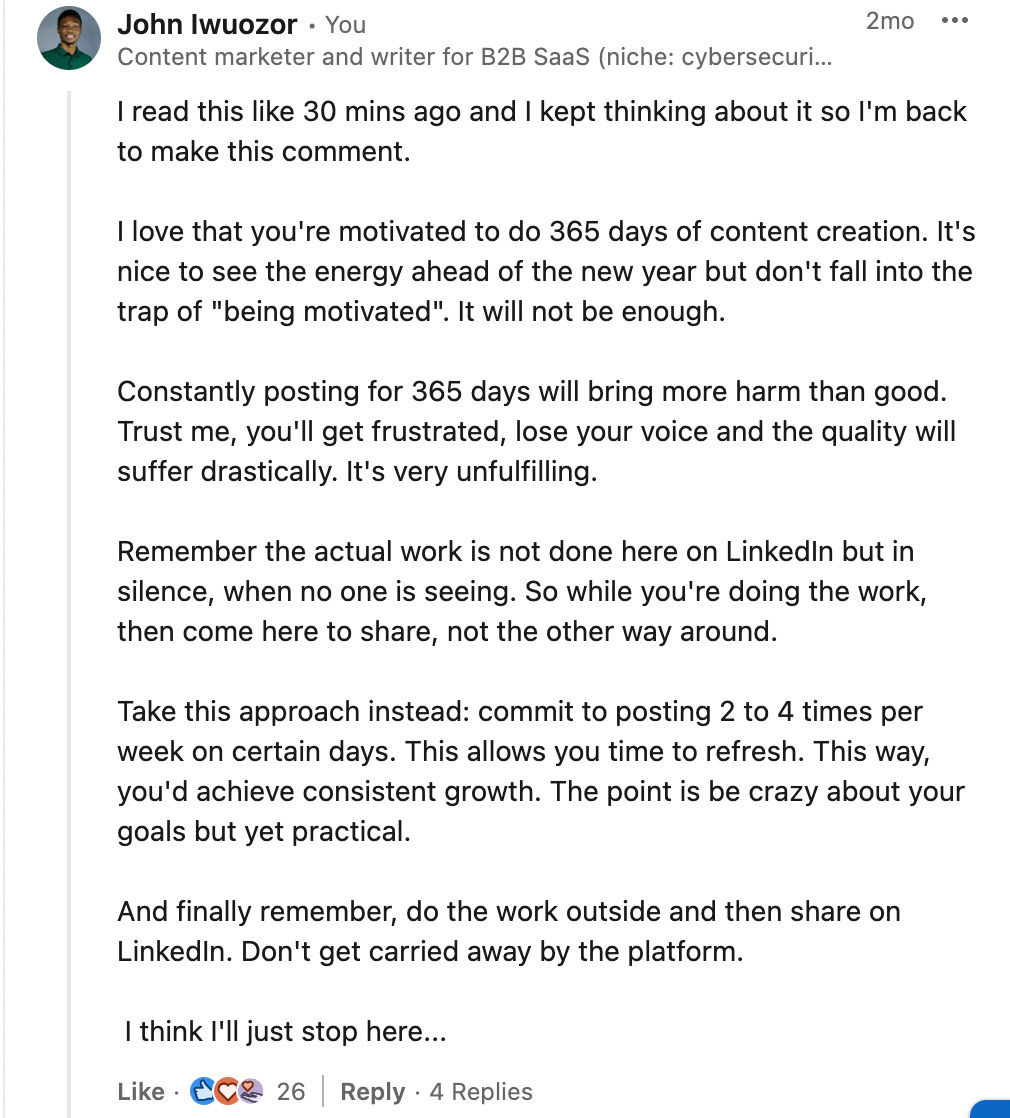Hey everyone 👋
It's been a minute. The last time I wrote here was February 2023—about two years ago. I had just started this newsletter, full of ‘ambition and determination’ to document my journey to $100k as a freelance writer.
Then I disappeared.
Truth is, I didn't want to write about what came next.
February/March 2023 hit like a ton of bricks. My income plummeted, and suddenly, the story wasn't as inspiring anymore.
Because how the hell do you write about chasing six figures when you're struggling to keep the lights on?
But today, I'm finally ready to share what happened next. Not because I've figured it all out, but because I believe it’s worth telling.
And boy, do I have a story to tell.
Back To The Beginning
Let's take a short trip right back to the genesis.
Back to when I was averaging about $300 to $500 per month in 2021, feeling like I had hit the jackpot.
I had just finished uni and been let go from my low-paying factory job. So, making this modest amount felt like freedom. I had just enough to put food on my table for the next day, and for me, that was good.
Or was it?
You see, I’m Nigerian and we’ve always been taught to be grateful and content with whatever we had. Having enough to survive was considered a blessing, anything beyond that was a luxury.
The problem with this thinking is that it limits your vision. When you don't know what's possible, you settle for what's available.
I wasn't dreaming bigger because I had no framework for "bigger." My entire concept of success was defined by the narrow experiences I'd had so far.
Then all of a sudden,
The six-figure dream was born unexpectedly at the end of 2021. When I think about how this happened, one moment stands out: discovering a post by chima, another Nigerian freelancer.
She had just announced hitting six figures in a single year as a strategist and writer.
This post hit me differently than any motivational content I'd seen before. It wasn't a vague "follow your dreams" message from someone with vastly different circumstances.
This was someone from my country, dealing with similar infrastructural challenges and cultural expectations, yet she had achieved something I hadn't even allowed myself to imagine.
It was like my brain suddenly recalibrated.
The mental ceiling I had constructed vanished in an instant. If she could do it, why couldn't I?
This wasn't the first time I'd experienced this mental shift. Earlier that year, I was about to work with a U.S. agency that asked for my rates. I proposed $0.035 per word, and was even ready to negotiate down. To my shock, they countered with $0.20 per word instead. Yeah, that mind leap, that’s what I mean.
When I saw chima's post, earning that amount sounded like a crazy goal that only the best of the best of the best could achieve.
But here was a woman. Living in Nigeria. Facing multiple struggles. Yet overcoming all odds to hit this milestone.
I looked at myself. I wasn't even making $1K per month, but something clicked. A strange confidence took hold, an unusual ambition to work my way up to that figure.
I had no strategy, no roadmap, no special connections, no nothing. I just had a newly expanded sense of what was possible.
So I said to myself: "If she could do it, I can at least try."
And so it began. In 2022, I was vocal about my earnings. When I made ~$2.5k, I was ecstatic—finally, progress. I think 3-4 months later, I hit $3k (not quite represented in the graph).
Then, in November 2022, I hit $6.8k. I was over the moon as it was my first time clearing $5k.
At this point, I felt set. Ready. It was time to hit my main goal in 2023.
I still had no strategy, no steady client acquisition process, no referral networks or sorts, none of these. The only thing was that unusual faith and confidence that I could do it.
But as it turns out, life is not always linear.
Fast Forward to February 2023
February 2023 began like any other month. I'd just published the first issue of my newsletter, proudly documenting my journey to six figures. I set these ambitious targets for the year, convinced I was on track after my $6.8K month in November.
January had been...decent. Not great, not terrible.
I chalked up the slowdown to "it’s the start of the year" and told myself I just needed to hustle harder. Add more energy. Do more outreach. Then I’ll be fine. Or so I thought.
Then projects began coming in really slow. I looked at my pipeline…there was nothing valid in it.
This created an immediate dilemma: what do I share in my Substack? I'd branded it as a journey to six figures, but this? Wasn’t in the plan. Say I had already failed when I was yet to start?
So I took a break, telling myself I'd restart it quarterly. Or semi-annually. Or whenever things turned around.
Meanwhile, I kept reassuring myself that work would pick up. Maybe budgets were being reassessed.
Scrolling through LinkedIn, some marketers and freelancers were posting about losing clients. ChatGPT had arrived just months earlier, and companies were slashing content budgets left and right as they tried to figure out if AI would replace human writers. It was a bloody mess.
Looking back, I should have been more proactive. Cold pitching, networking, anything to keep momentum. But denial is a powerful force. I kept clinging to false hope:
March would pick up (it didn’t),
Then April would be better (Nope),
Orrrrr surely May would turn things around (Probably worse).
The reality was hard to swallow: my business wasn't just having a bad month(s), it was slowly unraveling.
The hardest part? Opening LinkedIn. Seeing others seemingly crushing it. Posts about record months, new client wins, and growing teams filled my feed. Meanwhile, I was struggling to maintain what I'd built, let alone grow it.
I really wanted to make update posts to this newsletter several times. But I kept thinking, how do you tell people that your grand plan isn't working out? That the journey you promised to document is going sideways? That maybe you're not as good at this as you thought?
So I did what felt safest at the time. I stayed quiet, kept my head down and focused on surviving.
Then My Worst Fears Happened
Around July or August 2023, one of my two clients ended our relationship. That was 50% of my income automatically gone.
I almost went crazy.
The reason? “The quality of my work suddenly became bad” after working with them for more than a year. HOW? WHY? WHAT?
So I did what most freelancers would do: drafted multiple follow-up emails, checked and double-checked my recent work, and tried to find out what I did wrong. The responses never came.
That silence was worse than any criticism could have been. At least with criticism, you have something to work with, something to improve. But silence? That leaves you guessing. And in that void, every insecurity grows louder.
The timing couldn't have been worse. I'd been planning my move to the UK to pursue my dream master’s program. But dreams need funding, and half my income was gone.
Regardless, I kept working with my remaining client, grateful for whatever work came my way. They became my lifeline, not just financially but mentally.
The next few months were a lesson in humility, I’d say. I found myself back on Upwork, the same annoying platform I'd proudly "graduated" from years ago. But this time was different.
This time, I wasn't a beginner trying to break in. I was an experienced writer swallowing my pride, taking whatever work I could find. I landed a project writing a 30,000-word guide on data storytelling. The pay was poor but it was something. Then came an 80,000-word chess book. More long hours, more complex topics, more work for less money.
I would find more opportunities on the platform and make lots of Loom videos all in an attempt to ‘stand out and show my expertise’. Did it land me any new clients? Nope!
At some point, I got tired and quit again. I devoted the remaining time to making plans for a new niche site (on chess), drafting out the strategy and writing posts.
This was my mindset: If I couldn’t find any work out there, I could just as well make them up for myself. And that’s what I was doing.
If you follow me on LinkedIn, you might have seen where I recently highlighted that I went into monk mode. I went dark, eliminating 95% of distractions with pure focus on work and learning.
I spent a lot of time in my room working, brainstorming, and building.
I got busy or rather I MADE MYSELF BUSY:
Opened YouTube, Tiktok, FB pages for my chess site
Wrote guest posts (that are funnily yet to be published)
Handled a lot of tech SEO issues on same site
See a screenshot of my notes below.
But there’s just so much you can do before you get tired and give up.
By January 2024, I couldn’t ignore reality anymore. Had to defer my admission because I couldn’t meet up with the financial aspect. It was heart-wrenching for me honestly, but as you’ll come to see, taking a step back sometimes is the only way to move forward.
March 2024 Happened
March 2024 was when everything changed. And when I say everything, I mean EVERYTHING.
It started with a recruiter reaching out to me on LinkedIn asking if I was interested in a remote role. Then suddenly, I got more requests on LinkedIn.
What was happening? Did someone mention my name somewhere? Then a referral here, an application I replied to there, and my pipeline was already filled with more clients than I’ve had in the past 2 yrs.
The floodgates had opened. What followed was the most intense period of my career. By May 2024, I was juggling six high-paying clients. My monthly income jumped from zero in February 2024 to $28k in May 2024.
By the end of 2024, I'd made ~$167k. This isn't even about the money. I mean, yes, the money changed everything. It funded my move to the UK, my master's degree, gave me the freedom to breathe.
But I learned more important things during this entire journey.
My 10 Biggest Lessons
1. Success is never a straight line. Your path is uniquely yours
I used to obsess over other freelancers' journeys. I once convinced myself I'd only make six figures by selling strategy or topic clusters as packaged services because that's what I saw others doing.
Reality check: These big companies rarely needed what I thought they needed. What they actually wanted wasn't someone to build their strategy (they often already had one), but someone who could execute it perfectly—a writer they didn't need to micromanage, a partner they could trust.
My breakthrough came when I positioned myself not just as a writer who delivers articles like a robot, but as someone who makes decisions, pushes back when necessary, and contributes ideas on what works best. That's the value of being a strategic partner.
So, I made most of my money working with SaaS companies by executing their content strategy through blog writing. The lesson? The path that works for others might not work for you. Your journey might look completely different than mine or anyone else's. The key is to stay flexible, find what works for you, and then double down on it.
2. Niching down isn't optional. It’s essential.
Many freelancers think they need to be a jack-of-all-trades to make good money. My experience says the opposite is true. I discovered that niching down can happen in two powerful ways: by content medium and by industry focus.
Niching by medium: While I could theoretically create any type of content, I found my sweet spot in blog writing. For my best clients, I basically just wrote blogs. While I occasionally helped with other content needs like translating interviews or assisting with certain campaigns, about 90% of my work was creating blog posts.
This specialization made me incredibly efficient. I understood the format inside and out, knew exactly how to structure posts for maximum impact, and could turn them around quickly without sacrificing quality.
Niching by industry: At the same time, I narrowed my focus to specific industries where I could build deep knowledge. I became known specifically for cybersecurity/IT content. I was also well-versed in HR, finance, and SMB content, but cybersecurity became my primary calling card.
The double-niching approach created a powerful reputation effect. When people post about looking for a "cybersecurity blog writer" on LinkedIn, my name would come up from others. Colleagues would tag me saying, "John is your guy for this." That's what happens when you pick a lane and stick with it. You become the obvious choice.
So instead of constantly chasing work, the work started finding me. The more specialized I became, the more in-demand my services were. Counter-intuitively, narrowing my focus dramatically expanded my opportunities.
The lesson here is clear: don't try to be everything to everyone. Pick a content type you enjoy creating and can excel at. Choose industries where you can build genuine expertise. Then go deep rather than wide. Your specificity becomes your strength, and clients will seek you out precisely because you're not a generalist.
3. Create work that your clients will genuinely value
Trust compounds with quality. When I started with new clients, they'd typically give me one article as a test. As I delivered quality work consistently, they'd gradually trust me with more—one article became two, then four, then a regular monthly batch.
And the best thing about doing excellent work is that it leads to referrals. Some of my clients came through word of mouth. For most people, they don’t need so much.
Once you can prove that you’re reliable, you understand their business goals and can create content that can help them achieve those goals, basically someone who helps them win, they keep you around and tell others about you.
4. LinkedIn is not the end, but a means to an end
During my "quiet period" when I wasn't posting on LinkedIn, most of my clients still found me there. It showed me that LinkedIn works behind the scenes. You might not see results right away, but the platform keeps working for you in the background. Almost like a compound effect.
It might feel like nothing’s working. No DMs, no website enquiry, nothing. But you should know that many people watch silently, just lurking, who’d remember you when they need your skills.
See what I mean:
Someone searched "cybersecurity writer" and found my profile
A marketing leader on LinkedIn referred me for a project that brought in $22k over three months
I applied to a job post I saw on LinkedIn and got hired
A prospect reached out a year after our initial contact
A recruiter found my profile and offered me a remote position
My longest client referred me to others (and they found me through LinkedIn initially)
And yes, it all worked for me because I had the portfolio to prove my worth. I see many people posting on LinkedIn for the sake of their personal brand, all because some expert said it’s the best way to get clients.
Yes, it is, but remember, it’s one thing to attract prospects, it’s another thing to actually convert them. Don’t spend all your time on the platform gathering engagement when you should be buffing up your profile.
I tell people, do the work outside of LinkedIn, then come to LinkedIn to share them. That way, you keep learning, improving, while building your online presence. LinkedIn is not an end but a means to an end.
5. Your website is your digital office. Treat it well.
Your website shapes how potential clients see your value. Like it or not, a professional site often signals quality and justifies higher rates. A basic or messy site suggests lower quality and invites people to haggle. I don’t make the rules, it happens.
Last year, a former client reached out to me on a certain day. We went on a call and ended up signing the contract on the same day.
When I asked, “Why did you decide to go with me?” The paraphrased reply was “Because of your professional website and the brands you have worked with.”
That should tell you something.
I'd like you to think of your website as a store that's open 24/7, showing off your expertise when you're not around. It's worth investing in because it pays off many times over.
6. Positioning determines pricing power
Last year, not a single client argued about my rates. I didn’t get a single “your rates are expensive” reply. And I feel that’s because of how I positioned myself. When you can explain exactly how you help clients and what special expertise you have, price becomes less important than the value you provide.
In this case, I stopped presenting myself as just a writer and became a content partner who:
Helps execute content strategy
Sets up efficient content processes
Maximizes the impact of every piece of content
When you position yourself as a valuable ally rather than just a service provider, clients stop questioning your rates and start valuing your partnership.
7. Don't overcomplicate your business
I've noticed freelancers often make things more complex than they need to be. From my experience, simplicity usually works better:
I don't use a complicated client onboarding process. Most clients simply tell me what they need, and I get started.
I rarely show formal rate cards. Clients ask what I charge, I tell them, and they usually just say "sounds good."
I use basic tools. Google Docs handles my writing, invoicing, and project management—and it even costs nothing.
I don't create elaborate proposals. A quick call and a simple email confirmation typically work fine.
I'm flexible with payment terms. Net-15 or net-30 has worked well, and I've never really had payment problems in over 3 years.
Of course, this is all my experience, but for new freelancers trying to find their way, my advice is simple: Focus on the basics. Do good work. Keep things straightforward. You can add more sophisticated systems later when your business actually needs them.
8. Experience builds on itself
Working with well-known companies creates a snowball effect. I noticed something interesting happened after I landed my first few enterprise clients. It’s like each impressive name on my portfolio made getting the next one significantly easier. More like a domino effect where one good client leads to another, then another.
This is unlike when I first started out. I spent time crafting proposals, doing free test articles, and negotiating rates. But once I had worked with a few recognizable brands, potential clients started approaching our conversations differently.
That’s because clients feel more comfortable hiring writers who have worked with brands they recognize because it reduces their perceived risk.
‘If Company X (that they admire) trusted you with their content, then you must know what you're doing.’
It's instant social proof that you can deliver quality work in a professional manner.
9. Build your network based on quality, not quantity
When things finally clicked for me, it wasn't through sending hundreds of cold emails or applying to every job posting. It was through a few people I knew.
For example, last year, I only found out about a great job because a connection made a comment in the post, and LinkedIn brought it to my feed. I wouldn't have seen it otherwise.
Most of my clients have come through:
Past clients recommending me to others
People finding my content online
Applying only to opportunities that really fit me
People in my network thinking of me when something comes up
I built these connections slowly, doing good work and helping people when I could. I also focused on connecting with people who cared about the same work I did.
When times get tough or when you're ready to grow, these real connections matter far more than how many followers you have. One person who genuinely values what you do can make a bigger difference than thousands who barely notice you.
10. The most important work happens when no one's watching
We live in a world that celebrates the highlight reel—the wins, the income reports, the success stories. But the real work happens in the quiet moments when no one's looking, when you're not posting about it, when you're just focused on getting better at your craft.
Behind every success story is usually a messy backstory filled with setbacks, doubts, and late nights. My six-figure year didn't happen because I was posting inspirational content, it happened because I was doing the unglamorous work of becoming truly skilled at my craft, even when nobody was paying attention.
As I've learned, "People win in public, not build in public." The messy middle—the struggles, the doubts, the changes in direction, the failures—that's where growth happens. That's where the foundation for success is built. And that's exactly what happened in my case.
Rounding this up,
I used to think success meant a steadily increasing income graph. I was wrong. Real success is messy. It's full of ups and downs, of dry spells and windfalls. It's about weathering the storms and staying the course.
It's about believing in your worth even when the market isn't validating it.
Because here's the truth: The only difference between a struggling freelancer and a successful one is time and persistence.
Where Do We Go From Here?
So here I am, writing this from my desk in the UK, doing the same master's program that once seemed out of reach. I’m grateful for that in so many ways.
When I started "Musings of an Ambitious Freelancer," it was all about documenting the journey to $100K. But now? That goal feels almost quaint. Not because it wasn't significant, but because I've realized there's so much more to build.
This space is evolving, just like I am. I like to look at the bigger picture in this case, no longer about monthly income reports or generic freelancing tips. I want to build something lasting, showing the messy, complicated process of turning freelance success into sustainable ventures.
You'll still get the behind-the-scenes looks at what I'm building. But instead of focusing solely on freelancing milestones, we'll explore what happens next.
How do you take skills built in the trenches of freelancing and use them to create something bigger? How do you transition from being just a service provider to building real, sustainable businesses?
The stories I'll share won't always be polished. They might not come with neat conclusions or actionable takeaways. But they'll be real.
To those who've stuck around during my silence, thank you. To those just joining now, welcome. You're not too late; we're just getting started.
And to anyone in their own quiet season right now, keep going. Keep building. Keep learning. Your breakthrough might be closer than you think.
I’m not sure how regular these updates will be, but trust me to share when there's something worth sharing.
Because if there's one thing I've learned in my year of silence, it's this: The best stories aren't the ones you plan to tell, they're the ones you live first and share later.
Until next time (whenever that may be),
John
—------------------------------------------------------------------------

















This was such a good read, just changed my entire perspective on failure, I've always thought I needed to constantly have my shit together and show up online even when I'm drowning, will be taking a different approach from today. Thanks for sharing.
Hi John, I just finished reading this. It feels a bit weird since I am also going through a quiet period of my own. The only difference is that I focused more on field work rather than writing during that time and day after day I wonder how I can be better or how I can secure clients. However it seems like a vague dream I’m not capable of achieving. I’ll keep watching out for this space to learn a thing or two. Thanks for sharing😊.